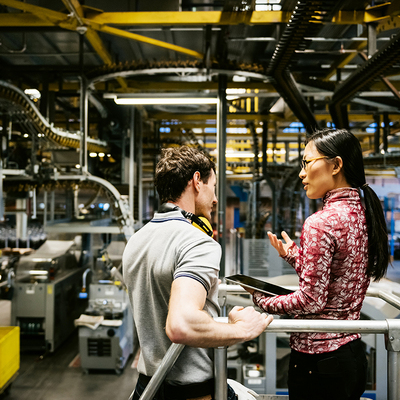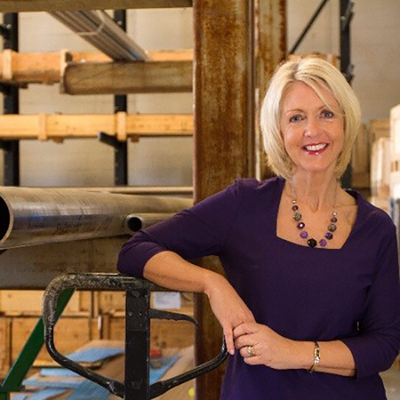Claire Lauder attended Cranfield University's National Manufacturing Debate 2019, an annual conference bringing manufacturing professionals together from various sectors to discuss and debate current challenges facing the industry.

After attending the National Manufacturing Debate this week, we were asked to do one thing by the brilliant compere Rosa Wilkinson. That one thing was to take the conversation about UK manufacturing sector beyond the “four walls”. At events like these everyone in the room is already a convert, they already believe in the importance of the sector, our challenge lies with those that don’t.
In my experience, even those working and running businesses in the sector are not always aware of the brilliant and often free resources available up and down the country. Sometimes when you are busy doing the day job it is easy for things to pass you by. This message is to ask you “what part can you play to continue to support the sector in overcoming many of its challenges, particularly around leadership and technology?”
It is clear the UK is making great strides in improving the landscape for manufacturers in comparison to ten years prior. There is a lot to celebrate. The rapid expansion of the HVM Catapult centres is one example, as they are now located in 18 places across the UK. Dick Elsy also talked of the most successful industrial strategy so far, the Faraday challenge, a goal to get 50% of cars on battery technology by 2030. This one opportunity reportedly presents a £4.8 billion supply chain opportunity for UK chemical and materials companies. The HVM Catapults support both large and SME companies.
The Made Smarter Pilot currently taking place across the NW has apparently already started delivering significant results, despite it being a scheme that has been running for less than a year. The successes are already so great that Professor Jurgen Maier alluded that the Made Smarter scheme will be rolled out to other regions soon. He also talked positively about the improvement of new skills coming into the sector at apprentice and graduate level, the fact that the country has finally woken up to the importance of the sector and the importance of us needing to be good at “the making and exporting of things”. He celebrated the widely accepted truth that we are really quite good at innovation and our R&D capability is world class.
Whilst there is lots to celebrate, there is much more left to do. Much of the conversation centred around Supply Chain in an Industry 4.0 era. How digital ready are the UK’s manufacturers?
Professor Richard Wilding and Professor Janet Godsell left everyone in the room thinking about making a career move into Supply Chain. Two hugely energetic and engaging speakers clearly impassioned about the opportunity across all industries for a fully integrated supply chain. Prof Godsell talked us through the % of companies and their “digital readiness” with only 13% currently at level 3. Apparently, the leap from level 2 to level 3 is significant.
It was said by multiple experts involved in the debate that the UK business mindset needs a significant cultural shift. Mike Wilson Managing Director of Kuka UK said that in the UK “we are proud of how good we are at keeping old machines running, in Germany they are proud of investing in new technology and equipment”.
Access to finance for many business owners is difficult, they don’t have the freedom to take big risks because the difference between failure and success is often extreme. It is no coincidence that the risk averse attitudes are likely in some way linked to the demographic that are running many of these SME businesses. Why would you take risks and potentially erode your financial security approaching retirement? I touched upon this challenge in a previous blog - "Bigger than Brexit?"
How does this new interconnected, fast paced, riskier, more volatile and competitive landscape fit in with the conservative leadership and decision making style often associated with the manufacturing sector? In short, it doesn’t.
Leadership challenges were mentioned continuously throughout the day. Many UK leaders are not quick enough at adopting new technologies, they are too risk averse, they lack diversity, which McKinsey highlights as having a huge impact on innovation and profitability.
What can you do to help improve the situation?
- Have you met with your relevant catapult and technology centres?
- Have you looked at the Made Smarter website?
- Do you know what local businesses and education providers are doing to upskill their workforces?
- Have you been in touch with any universities lately?
- Could a knowledge Transfer programme give part of your business a competitive advantage?
- Have you put your leaders through Unconscious Bias training to make sure you are not only attracting the best talent but also retaining them?
- Do you have an inclusive culture that allows for people from different backgrounds to prosper?
- Do you know your company’s current state of “digital readiness”?
- Are you having the conversation within your company about what you could be trying?
- Are you using the very many resources available?
The challenges are too big to be tackled by one group or institution. It needs an army continually banging the drum and challenging the status quo of the sector. I have done this for the last seven years and will continue to do so.
Boyden can help in providing leadership assessment and development as well as assisting companies in identifying interim and permanent executive talent.
This blog post was also published on LinkedIn: https://www.linkedin.com/pulse/national-manufacturing-debate-2019-claire-lauder/




